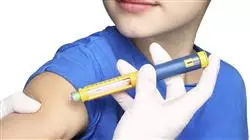University certificate
The world's largest faculty of medicine”
Introduction to the Program
This Hybrid professional master’s degree unifies, like no other program, the advances in Clinical Nutrition in Pediatrics that you so desire to update your professional practice"

The high incidence of Diabetes and Obesity in children has forced researchers in Clinical Nutrition in Pediatrics to search for new clinical procedures for the management and recovery of their patients. For this reason, this medical field is currently undergoing constant renewal and new work methodologies are continually appearing, making the professional work of specialists more complex. Keeping up with the times is a challenge and, to do so, everyone demands educational programs that help them develop a better understanding and greater skills in addressing eating disorders and specific nutritional requirements.
TECH, aware of this context, has created a program whose study model is pioneering in its type. As a result, this Hybrid professional master’s degree in Clinical Nutrition in Pediatrics offers a learning option marked by two well-differentiated stages. Initially, the doctor will study theoretically all the advances in this health sector, dedicating 1,500 hours of academic analysis to the contents provided in a 100% online and interactive platform. From there, you can reinforce your knowledge through multimedia resources such as infographics, videos, and interactive summaries. Relearning, a rigorous methodology that will allow you to master all subjects with greater flexibility and speed, is the main teaching tool.
Then, in a second study phase, the specialist will have a 120-hour clinical internship in an international reference hospital. That process will be organized from Monday to Friday, until completing 3 weeks, in which you will have access to the most modern technologies and assistance protocols. The stay has a face-to-face character and differs from others in the educational scenario by allowing direct contact of the doctor with real patients from the very first moment. In addition, the entire practical phase will be advised by leading experts and an assistant tutor. In this way, the student's educational progress will be properly monitored and they will be able to focus on specific areas to improve their skills with the highest level of rigor and exigency.
With 1,500 hours of theoretical learning and 120 hours of clinical practice you will be ready to face the most modern challenges in the field of Clinical Nutrition in Pediatrics"
This Hybrid professional master’s degree in Clinical Nutrition in Pediatrics contains the most complete and up-to-date scientific program on the market. The most important features include:
- Development of more than 100 clinical cases presented by professionals in Clinical Nutrition in Pediatrics.
- The graphic, schematic, and practical contents with which they are created, provide scientific and practical information on the disciplines that are essential for professional practice
- Comprehensive systematized action plans for the main pathologies.
- Presentation of practical workshops on procedures, diagnosis, and treatment techniques in nutritional requirements pediatric patients
- An algorithm-based interactive learning system for decision-making in the clinical situations presented throughout the course.
- Practical clinical guides on approaching different pathologies
- All of this will be complemented by theoretical lessons, questions to the expert, debate forums on controversial topics, and individual reflection assignments.
- Content that is accessible from any fixed or portable device with an Internet connection
- Furthermore, you will be able to carry out a clinical internship in one of the best hospital centers
This program is everything you need to become a cutting-edge specialist, capable of managing complex endocrinological conditions such as Diabetes, from a nutritional point of view"
In this Master's proposal, with a vocational nature and hybrid learning modality, the program is aimed at updating Clinical Nutrition in Pediatrics and professionals who require a high level of qualification. The contents are based on the latest scientific evidence, and oriented in an educational way to integrate theoretical knowledge into practice, and the theoretical-practical elements will facilitate knowledge update and decision-making in patient management.
Thanks to their multimedia content developed with the latest educational technology, they will allow the medical professional to obtain situated and contextual learning, i.e. a simulated environment that will provide immersive learning programmed to train in real situations. This program is designed around Problem-Based Learning, whereby the professional must try to solve the different professional practice situations that arise throughout the program. For this purpose, the students will be assisted by an innovative interactive video system created by renowned and experienced experts.
In the theoretical phase of this program you will have access to the latest concepts and interventional protocols of Clinical Nutrition in Pediatrics"

For 3 weeks of intensive, practical, on-site training, you will apply modern methodologies for the treatment of severe gastroenterophageal pathologies in childhood"
Why study at TECH?
TECH is the world’s largest online university. With an impressive catalog of more than 14,000 university programs available in 11 languages, it is positioned as a leader in employability, with a 99% job placement rate. In addition, it relies on an enormous faculty of more than 6,000 professors of the highest international renown.

Study at the world's largest online university and guarantee your professional success. The future starts at TECH”
The world’s best online university according to FORBES
The prestigious Forbes magazine, specialized in business and finance, has highlighted TECH as “the world's best online university” This is what they have recently stated in an article in their digital edition in which they echo the success story of this institution, “thanks to the academic offer it provides, the selection of its teaching staff, and an innovative learning method aimed at educating the professionals of the future”
A revolutionary study method, a cutting-edge faculty and a practical focus: the key to TECH's success.
The most complete study plans on the university scene
TECH offers the most complete study plans on the university scene, with syllabuses that cover fundamental concepts and, at the same time, the main scientific advances in their specific scientific areas. In addition, these programs are continuously being updated to guarantee students the academic vanguard and the most in-demand professional skills. In this way, the university's qualifications provide its graduates with a significant advantage to propel their careers to success.
TECH offers the most comprehensive and intensive study plans on the current university scene.
A world-class teaching staff
TECH's teaching staff is made up of more than 6,000 professors with the highest international recognition. Professors, researchers and top executives of multinational companies, including Isaiah Covington, performance coach of the Boston Celtics; Magda Romanska, principal investigator at Harvard MetaLAB; Ignacio Wistumba, chairman of the department of translational molecular pathology at MD Anderson Cancer Center; and D.W. Pine, creative director of TIME magazine, among others.
Internationally renowned experts, specialized in different branches of Health, Technology, Communication and Business, form part of the TECH faculty.
A unique learning method
TECH is the first university to use Relearning in all its programs. It is the best online learning methodology, accredited with international teaching quality certifications, provided by prestigious educational agencies. In addition, this disruptive educational model is complemented with the “Case Method”, thereby setting up a unique online teaching strategy. Innovative teaching resources are also implemented, including detailed videos, infographics and interactive summaries.
TECH combines Relearning and the Case Method in all its university programs to guarantee excellent theoretical and practical learning, studying whenever and wherever you want.
The world's largest online university
TECH is the world’s largest online university. We are the largest educational institution, with the best and widest online educational catalog, one hundred percent online and covering the vast majority of areas of knowledge. We offer a large selection of our own degrees and accredited online undergraduate and postgraduate degrees. In total, more than 14,000 university degrees, in eleven different languages, make us the largest educational largest in the world.
TECH has the world's most extensive catalog of academic and official programs, available in more than 11 languages.
Google Premier Partner
The American technology giant has awarded TECH the Google Google Premier Partner badge. This award, which is only available to 3% of the world's companies, highlights the efficient, flexible and tailored experience that this university provides to students. The recognition as a Google Premier Partner not only accredits the maximum rigor, performance and investment in TECH's digital infrastructures, but also places this university as one of the world's leading technology companies.
Google has positioned TECH in the top 3% of the world's most important technology companies by awarding it its Google Premier Partner badge.
The official online university of the NBA
TECH is the official online university of the NBA. Thanks to our agreement with the biggest league in basketball, we offer our students exclusive university programs, as well as a wide variety of educational resources focused on the business of the league and other areas of the sports industry. Each program is made up of a uniquely designed syllabus and features exceptional guest hosts: professionals with a distinguished sports background who will offer their expertise on the most relevant topics.
TECH has been selected by the NBA, the world's top basketball league, as its official online university.
The top-rated university by its students
Students have positioned TECH as the world's top-rated university on the main review websites, with a highest rating of 4.9 out of 5, obtained from more than 1,000 reviews. These results consolidate TECH as the benchmark university institution at an international level, reflecting the excellence and positive impact of its educational model.” reflecting the excellence and positive impact of its educational model.”
TECH is the world’s top-rated university by its students.
Leaders in employability
TECH has managed to become the leading university in employability. 99% of its students obtain jobs in the academic field they have studied, within one year of completing any of the university's programs. A similar number achieve immediate career enhancement. All this thanks to a study methodology that bases its effectiveness on the acquisition of practical skills, which are absolutely necessary for professional development.
99% of TECH graduates find a job within a year of completing their studies.
Clinical Nutrition in Pediatrics
The Hybrid Professional Master's Degree in Clinical Nutrition in Pediatrics at TECH Global University, is an academic program designed to train professionals in the nutritional care of children and adolescents from birth to 18 years of age. This graduate program focuses on the prevention, diagnosis and treatment of nutrition-related diseases in the pediatric population. The Hybrid Professional Master's Degree in Clinical Nutrition in Pediatrics combines theory and practice, which is why it is taught in blended mode. Students will have access to a virtual platform that will allow them to follow classes online and establish communication with teachers and other classmates virtually. The objectives of the Hybrid Professional Master's Degree in Clinical Nutrition in Pediatrics are numerous. The program aims for students to acquire knowledge in areas such as the composition and nutritional value of food, the digestive process, clinical and anthropometric analysis, nutrition in pathological situations, enteral and parenteral nutrition, and nutritional assessment and diagnosis. In addition, during the course, students will be able to put these skills into practice in a supervised clinical setting.
Learn and evolve in clinical nutrition in pediatrics
This postgraduate program is aimed at healthcare professionals interested in pediatric nutritional care. It is important to know what our children consume and how they are feeding, that is why The Hybrid Professional Master's Degree in Clinical Nutrition in Pediatrics is taught by a teaching team with extensive experience and recognized prestige in the area of clinical nutrition. TECH's Hybrid Professional Master's Degree in Clinical Nutrition in Pediatrics is a high-level academic program focused on improving the nutritional care of the pediatric population. This program combines theory with practice, providing students with a comprehensive and practical approach in the field of clinical nutrition. With this program, students will be able to acquire valuable skills and knowledge, as well as enhance their job and professional profile.







